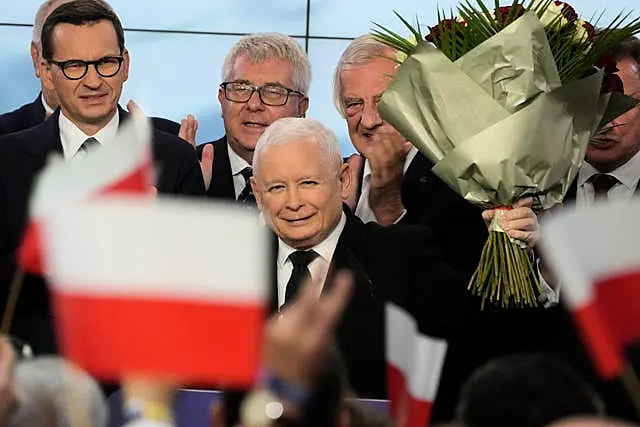The opposition leader who hopes to be Poland’s new prime minister has appealed to the nation’s president for “energetic and fast decisions” so that a new government can be formed quickly.
Three opposition parties that vowed to restore democratic standards in Poland together won over 54% of the votes in the nation’s weekend parliamentary election, putting them in a position to take power, according to the complete ballot count reported on Tuesday.
Poland’s constitution now requires President Andrzej Duda to assess the new political alignment of forces and to appoint a new prime minister who is tasked with forming a government that will need parliament’s approval, all within a set timeframe.

In a video statement, Donald Tusk appealed to Mr Duda, saying, “I would like to ask for energetic and quick decisions”, and stressing that “the winning democratic parties are ready to take over responsibility for governing the country any moment”.
“People are waiting for the first decisions that will be the result of the elections” that took place on Sunday, Mr Tusk said.
Mr Duda is an ally of the conservative Law and Justice party, which has been in power since 2015. His term runs until 2025.
Law and Justice, which governed the country for eight turbulent years, won slightly over 35% of the votes, making it the single party with the most votes. But the party and its leader Jaroslaw Kaczynski lost their majority in parliament and appeared to have no way to hold on to power.
Turnout was nearly 75%, the highest since Poland’s return to democracy, surpassing even the level of 63% in 1989, a vote that triggered the collapse of the oppressive Soviet-backed communist system.
Law and Justice had been leading the country down an illiberal path, taking control of courts in a manner that violated the country’s constitution.
The party politicised state institutions, including taxpayer-funded public media which it used as a propaganda tool to praise itself and vilify opponents.

The election result was a huge victory for Mr Tusk, the head of the largest opposition group, Civic Coalition.
He appears likely to return to his past role as Polish prime minister, a job he held from 2007-14. He also served as European Council president, a top job in the EU, from 2014-19.
Mr Tusk’s success is all the more remarkable given that state media went into overdrive to portray him as a stooge of Germany and Russia. That portrayal, which appeared baseless, also won him much sympathy.
Mr Tusk himself won more than half a million votes running for a seat in parliament. His party said it was the best result in the history of parliamentary elections in Poland.
The result was a huge relief for Poles concerned about the country’s international isolation at a time of war across the border in Ukraine and the constant bickering with the European Union. Many feared it could lead to Poland’s eventual exit from the 27-member bloc.
The LGBT+ community also suffered a smear campaign in recent years, portrayed as a threat to the nation by the conservative ruling party. Liberal critics were sometimes depicted as disloyal to the country.
The National Electoral Commission said that Law and Justice won slightly over 35% of the votes, and the far-right Confederation party, a possible ally, about 7%.

Three opposition groups won a total of 53.7%, enough for a comfortable majority of 248 seats in the 460-seat lower house of parliament, or Sejm. Civic Coalition garnered 30.7% of the vote while the centrist Third Way got 14.4% and the New Left about 8.6%.
The three ran on separate tickets so they are not formally part of the same coalition, but all promised to cooperate to restore the rule of law.
Law and Justice will have 194 seats, far short of the majority it held for eight years.
Although the voting is over, it might still take weeks for a new government to be in place.
Mr Duda must call the first session of the new parliament within 30 days of election day and appoint a prime minister to form a government.
In the meantime, the current government will remain in a caretaker role.







